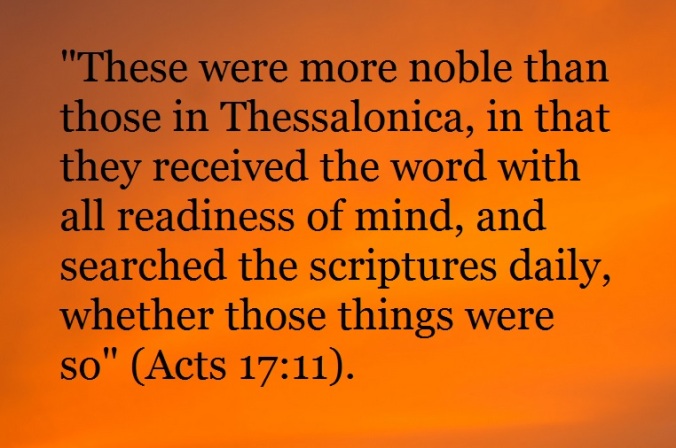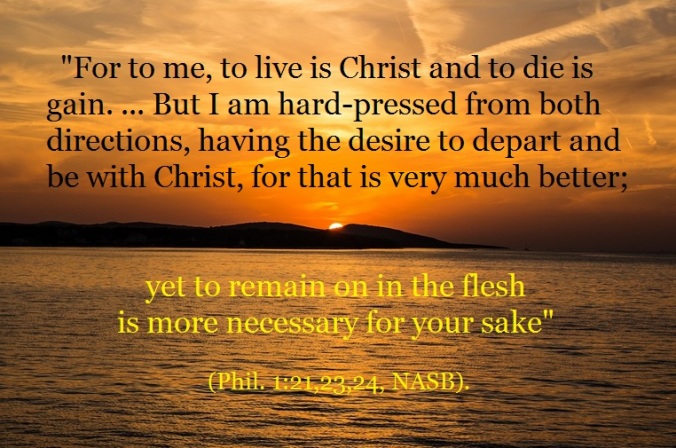“Go therefore and make disciples of all the nations…teaching them to observe all that I commanded you; and lo, I am with you always, even to the end of the age” (Matthew 28:19-20, NASB).
——————–
Contents:
1) The Cost of Influence and Reputation (Bill Hall)
2) The Greater Love (via Brief Exhortation)
——————–

-1-
The Cost of Influence and Reputation
Bill Hall
There are people in this world who are possessed with natural ability to lead and command respect of others. Call it charm, charisma, magnetism, or whatever; such people wield a powerful influence on those who look up to them as the embodiment of all they would like to become themselves. Peter apparently possessed such qualities among the apostles. There were David, Deborah, Nehemiah, and others. We have known such people in our day and have been influenced by them. Each reader can probably think of some “hero” of faith that he or she has looked up to through the years.
The opportunities for good that such people possess are tremendous, but so are the responsibilities. It is true that sin is sin, whoever commits it — that sin will separate one person from God just as quickly as it will another. But the adverse consequences of one’s sins increase dramatically with the increase of the influence and reputation he enjoys among others. The confidence of others is a trust that must be carefully protected. Once that trust is in place, the person to whom it is committed has responsibilities that others of more normal influence and reputation do not have. And the more people involved in the trust, the greater the responsibility.
Those of reputation must be prepared for greater public scandal when they sin. Nathan told David that because of his adultery he had “given great occasion to the enemies of the Lord to blaspheme” (2 Samuel 12:14). Others had committed adultery in Israel, and their adultery had gone unnoticed by the enemies of God. But this was David! It was inevitable that the sin of this one man of influence and reputation would result in greater scandal than the sins of a multitude of people of lesser influence and reputation.
Those of reputation must be prepared for sterner rebuke when they sin than those of lesser reputation. Paul speaks of withstanding Peter “to his face” when Peter withdrew from eating with the Gentiles (Galatians 2:11-13). Paul’s rebuke of Peter was “before them all.” Peter was hardly the first Jewish Christian to refuse to eat with Gentile Christians, but Paul obviously recognized the seriousness of Peter’s actions because of his greater reputation and influence. Others were following his lead on this occasion, including Barnabas. Peter could not enjoy the luxury of a private meeting with Paul; Peter had to face the sting of immediate and open rebuke. Peter had betrayed a trust. Nothing less than open rebuke could counteract the harm that was resulting. Sterner rebuke is simply a cost — an inevitable cost — of influence and reputation.
Those of reputation must live more cautiously than others if they would maintain their influence and good name. Every Christian is warned not to place a stumbling block in his brother’s way (Romans 14:13; 1 Corinthians 8:9), but one who is known and admired by thousands of brethren in many places obviously will have to be more cautious than one who is known and admired by only a few brethren locally. Paul would have to give up far more to be “all things to all men” than would some Christian who had never been outside his home community. That’s just the cost of influence and reputation. If one is not willing to pay that cost, if he is determined to be unbending in his conduct “no matter what others might think,” he needs to come to a greater appreciation of the value of a good name (Proverbs 22:1).
Those of reputation must be especially careful to build upon Jesus Christ, the true foundation, rather than upon themselves. The words, “For we do not preach ourselves, but Christ Jesus the Lord,” must become their motto (2 Corinthians 4:5). Those who place their loyalty in men of name and reputation are in error. Their faith is not what it ought to be. But those who deliberately use charisma and flattery to attract a following are also in error (1 Thessalonians 2:1-13). The more natural charisma one is blessed with, the more cautious he must be.
When “Shoeless” Joe Jackson, a star Chicago White Sox outfielder, was involved in the “Black Sox” scandal of the 1920’s and was on his way to trial, a small boy, hurt, disappointed, with tears in his eyes, was heard to cry, “Say it ain’t so, Joe; say it ain’t so.”
Each reader is likely somebody’s hero. Other readers are men and women of widespread influence. Let each one, when he is tempted, and before he yields, look ahead to the tears and hurt and disillusionment that he is about to bring to those who look up to him. Let him hear their potential cries of “Say it ain’t so, Joe” and, motivated by their confidence and his own love for the Lord, let him “resist the devil.” If he betrays the trust that has been committed to him, he can be saved eternally through repentance and forgiveness, but he likely will never recover the confidence he has lost. Right or wrong, that’s reality. It is the cost — the inevitable cost — of influence and reputation.
— Via The Auburn Beacon, April 17, 2016, Volume 7, Issue 31
——————–

-2-
The Greater Love
“Greater love has no one than this, than to lay down one’s life for his friends” (John 15:13).
In his book, “Written in Blood,” Robert Coleman tells the story of a little boy whose sister needed a blood transfusion. The doctor had explained that she had the same disease the boy had recovered from two years earlier. Her only chance for recovery was a transfusion from someone who had previously conquered the disease. Since the two children had the same rare blood type, the boy was the ideal donor.
“Would you give your blood to your sister Mary?” the doctor asked. Little Johnny hesitated, his lower lip started to tremble, and then he smiled and said, “Sure, for my sister.”
Soon the two children were wheeled into the hospital room–Mary, pale and thin; Johnny, robust and healthy. Neither spoke, but when they met, Johnny grinned. As the nurse inserted the needle into his arm, Johnny’s smile faded. He watched the blood flow through the tube.
With the ordeal almost over, his voice slightly shaky, broke the silence. “Doctor, when do I die?” Only then did the doctor realize why Johnny had hesitated, why his lip had trembled when he’d agreed to donate his blood. He’d thought giving his blood to his sister meant giving up his life. Though, in reality, it was not necessary, he was willing to give his life for his sister. In that brief moment, his love for his sister, caused him to make his great decision.
Let us remember that there was one who laid down His life for us.
— via Brief Exhortations
——————–
The Steps That Lead to Eternal Salvation
1) Hear the gospel, for that is how faith comes (Rom. 10:17; John 20:30,31).
2) Believe in the deity of Christ (John 8:24; John 3:18).
3) Repent of sins (Luke 13:5; Acts 17:30).
4) Confess faith in Christ (Rom. 10:9,10; Acts 8:36-38).
5) Be baptized in water for the remission of sins (Mark 16:16; Acts 2:38; 22:16; Rom. 6:3,4; Gal. 3:26,27; 1 Pet. 3:21).
6) Continue in the faith, living for the Lord; for, if not, salvation can be lost (Heb. 10:36-39; Rev. 2:10; 2 Pet. 2:20-22).
——————–
Tebeau Street
CHURCH OF CHRIST
1402 Tebeau Street, Waycross, GA 31501
Sunday services: 9:00 AM (Bible class); 10 AM & 5 PM (worship)
Wednesday: 7 PM (Bible class)
evangelist/editor: Tom Edwards (912) 281-9917
Tom@ThomasTEdwards.com
http://thomastedwards.com/go (Older version of Gospel Observer website without pictures, but back to March 1990)
http://tebeaustreetchurchofchrist.org/
http://ThomasTEdwards.com/audioser.html (audio sermons)




